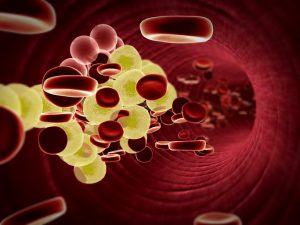 High cholesterol may lead to osteoarthritis by causing cartilage cells to die. Researcher Indira Prasadam said, “Our team has already begun working alongside dietitians to try to educate the public about healthy eating and how to keep cholesterol levels at a manageable level that won’t damage joints, in collaboration with orthopedic surgeons based at Prince Charles Hospital, Brisbane, Australia.”
High cholesterol may lead to osteoarthritis by causing cartilage cells to die. Researcher Indira Prasadam said, “Our team has already begun working alongside dietitians to try to educate the public about healthy eating and how to keep cholesterol levels at a manageable level that won’t damage joints, in collaboration with orthopedic surgeons based at Prince Charles Hospital, Brisbane, Australia.”
The researchers used two different animal models to mimic high cholesterol as seen in humans. The first was a mouse model with the altered gene ApoE-/- which leads to high cholesterol. The second was a rat model on a high-cholesterol diet which contributed to high cholesterol.
Advertisement
All rodents underwent a surgery mimicking knee injuries to bring on the development of osteoarthritis. After the surgery, the subjects in both groups were fed either high-cholesterol diet or a normal (control) diet. In both models, those on high-cholesterol diet developed a more severe osteoarthritis, compared to the controls.
On the other hand, when the animals were exposed to cholesterol-lowering drugs, the development of osteoarthritis was decreased.
“Just when we thought all the angles on osteoarthritis had been uncovered, a new lead like this comes along. The focus of hypercholesterolemia, whether familial or sporadic, has, of course, always been on arterial disease, but here we have a fascinating new discovery,” explained Thoru Pederson, Editor-in-Chief of The FASEB Journal.
Other effects of high cholesterol on the body
Cholesterol is a known risk factor for cardiovascular disease, but it can affect the body in a number of other ways. For starters, it can impede the blood flow, which means a limited blood supply reaching different organs and parts of the body, affecting their ability to carry out essential functions and over time leading to illness. Another implication is an increased workload for the heart that is forced to work harder to meet the blood flow demand. This can damage the heart, increasing the risk of a heart attack, heart failure, or even stroke.
Advertisement
Cholesterol can also wreak havoc on the digestive system. High cholesterol levels can cause a bile imbalance, leading to gallstones. Studies have shown that 80 percent of reported gallstones are formed as a result of high cholesterol.
Furthermore, cholesterol plaque buildup can result in a blockage of the arteries leading to the intestines and the colon. This can limit the blood flow to the digestive system, affecting its functioning. As a result, a person may experience nausea, vomiting, pain, and bloody stools.
Basically, high-cholesterol levels can contribute to many health problems, including chest pain, numbness in the legs, blockages in the brain, and jaw pain. This is why it is so important that you properly manage your cholesterol levels through healthy lifestyle habits such as exercising regularly and eating well, which includes monitoring your cholesterol intake.
